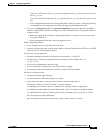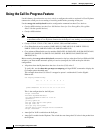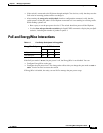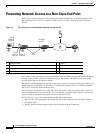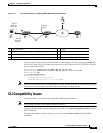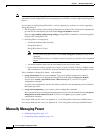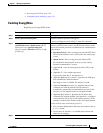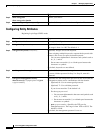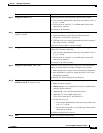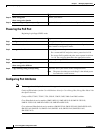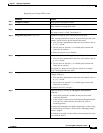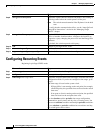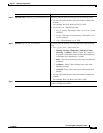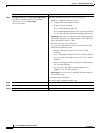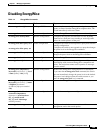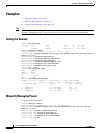
1-19
Cisco EnergyWise Configuration Guide
OL-19806-03
Chapter 1 Managing Single Entities
Manually Managing Power
Step 6
energywise name name (Optional) Specifies the EnergyWise-specific entity name.
• You can enter alphanumeric characters and symbols such as
#, (, $, !, and &.
• Do not enter an asterisk (*) or a blank space between the
characters or symbols.
The default is the hostname.
Step 7
energywise neighbor [hostname| ip-address]
udp-port-number
(Optional) Assigns a static neighbor.
• (Optional) Domain Name System (DNS) hostname
(hostname) or IP address (ip-address).
• UDP port (udp-port-number) that sends and receives queries.
The range is from 1 to 65000.
By default, static neighbors are not assigned.
Step 8
energywise role role (Optional) Specifies the role of the entity in the EnergyWise
domain. For example, lobby.b20.
• You can enter alphanumeric characters and symbols such as
#, (, $, !, and &.
• Do not enter an asterisk (*) or a blank space between the
characters or symbols.
The default is the model number.
Step 9
energywise allow query {save | set} (Optional) If the switch receives a query from the management
station or another domain member, configures the switch to
• save—Responds to a query to save the running configuration.
• set—Responds to a query to change the power level or the
EnergyWise attributes.
By default, the switch responds to the set query.
Step 10
energywise endpoint security {none |
shared-secret [0 | 7] shared-secret}
(Optional) Sets the security mode for an end point.
• none—Disables security.
• shared-secret—Uses a password for secure communication
with the domain member.
• (Optional) 0—Uses an unencrypted password.
• (Optional) 7—Uses a hidden password.
If you do not enter 0 or 7, the default is 0.
• For the shared-secret
–
You can enter alphanumeric characters and symbols such
as #, (, $, !, and &.
–
Do not enter an asterisk (*) or a blank space between the
characters or symbols.
By default, the password is not set.
Step 11
end Return to privileged EXEC mode.
Command Purpose



